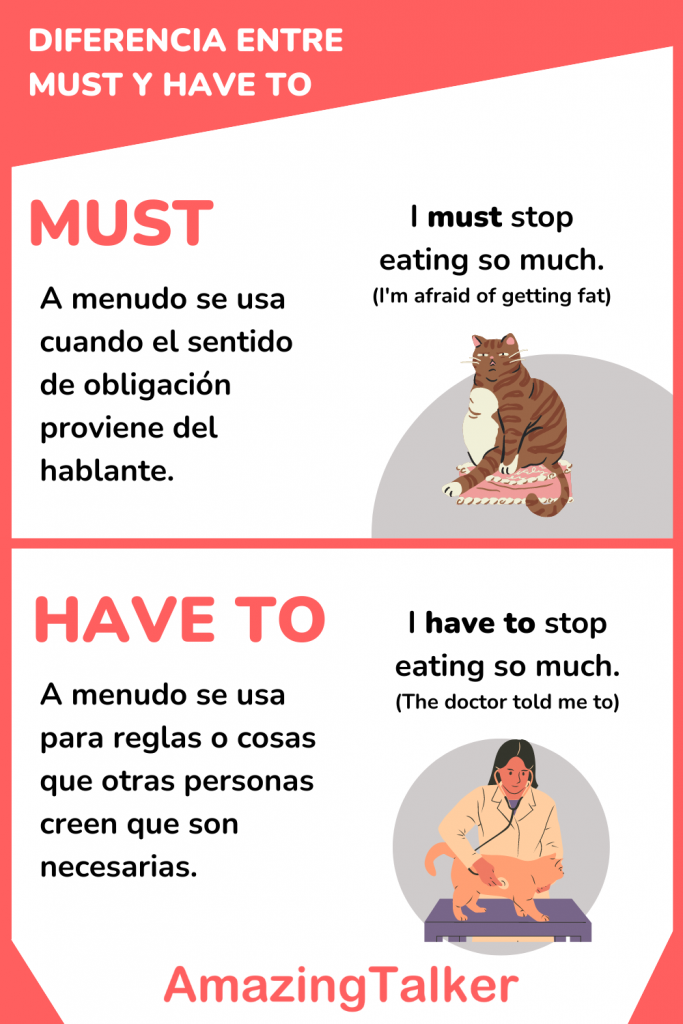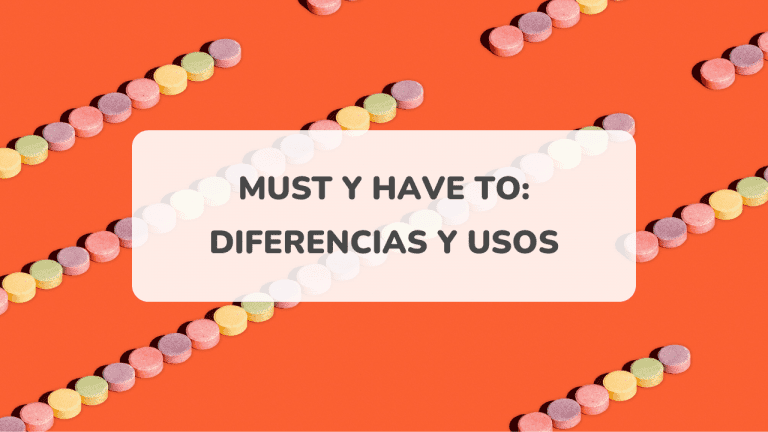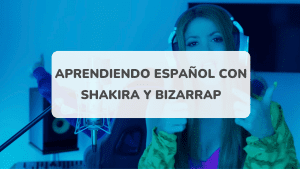En este artículo encontrarás cuales son las diferencias entre MUST y HAVE TO en inglés, sus diferentes estructuras gramaticales, en qué situación particular se ocupa cada uno, cuáles son sus tiempos verbales y su forma positiva y negativa.
También te enseñaremos la estructura para hacer preguntas y agregamos ejemplos y ejercicios para que pongas en práctica tus nuevos conocimientos ¡VAMOS POR ELLO!
Tabla de contenidos
Significado de Must y Have to
El significado literal de must como verbo es “deber” y es muy similar a have to “tener que”, ambos se refieren a una obligación, pero la forma correcta de utilizarlos depende del contexto. ¿Cuándo es correcto utilizar must o have to? Puede ser confuso, pero no te preocupes, abajo te dejamos toda la información que necesitas.

Estructura de Must
Primero hay que tomar en cuenta que must es un verbo modal por lo que no lleva TO y su forma es la misma sin importar el sujeto, es decir que para I/You/He/She/They/We seguirá siendo MUST o MUSTN´T (must+not en su forma negativa)

Su estructura es: sujeto + must + forma básica del verbo
- I must make my homework/ Debo hacer mi tarea
- You must arrive on time/ Debes llegar a tiempo
- She must do an inventory/ Ella debe hacer inventario
- He must pay his taxes/ Él debe pagar sus impuestos
- They mustn´t stay together/ Ellos no deben permanecer juntos
- We must watch “Infinity War” before anyone/ Debemos ver “Infinity War” antes que nadie
- It mustn’t take a lot of time/ No debe tomar mucho tiempo
Estructura de Have To
Con have to es diferente, aquí sí debemos usar TO antes del verbo y su forma cambia con el sujeto. Para I/You/They/We se utiliza HAVE TO o DON’T HAVE TO (en su forma negativa) y para He/She/It es HAS TO o DOESN’T HAVE TO (en su forma negativa).

Su estructura es: sujeto + have to + verbo en infinitivo + complemento
- I have to fall in love soon/ Tengo que enamorarme pronto
- He doesn’t have to get up early/ Él no tiene que levantarse temprano
- She has to publish her comic/ Ella tiene que publicar su cómic
- It has to work/ Tiene que funcionar
- We don’t have to trust him/ No tenemos que confiar en él
- They have to change the final of “Game of Thrones”/ Tienen que cambiar el final de “Game of Thrones”
Es verdad que suenan muy similares, incluso en español no podríamos notar la diferencia o incluso el significado no sonaría distinto, pero aquí te va en qué situaciones específicas debes usar must o have to:
Usos de Must
Forma positiva:
- Para expresar una obligación personal, impuesta por uno mismo.
I must stop watching Netflix / Debo dejar de ver Netflix
- El hablante expresa una necesidad o fuerte recomendación desde su punto de vista.
You must watch “Betty la Fea”/ Debes ver “Betty la Fea”
- Se utiliza para escribir reglas, leyes o dar instrucciones.
The students must use pink socks/ Los estudiantes deben usar calcetines rosas
- Cuando se deduce algo con mucha certeza.
I didn’t bring my book, It must be in my room/ No traje mi libro, debe estar en mi habitación
Forma negativa: Must not o Mustn’t (con contracción):
- Prohibición “no deber” de acuerdo a quien lo dice.
He mustn’t smoke in the airplane/ Él no debe fumar en el avión
- Prohibición de acuerdo a la ley, reglas o instrucciones.
They must not exceed the speed limits/ No deben exceder el límite de velocidad
Forma interrogativa:
- WH (palabras interrogativas) + must + sujeto + forma básica del verbo
Why mustn’t we smoke here?/ ¿Por qué no debemos fumar aquí?
Tiempos verbales de Must
Como verbo modal SOLO se puede usar para hablar sobre el Presente, pero no el pasado ni el futuro, para poder expresar la misma idea tendríamos que recurrir a HAVE TO. También sin importar el sujeto must y mustn’t no cambian.
Presente simple:
- We must leave/ Debemos irnos
- I mustn’t forget Pepe’s party. / No debo olvidar la pachanga de Pepe
- We musnt´t arrive late/ No debemos llegar tarde
- I mustn’t talk with strangers/ No debo hablar con extraños
- You mustn’t gossip/ No debes chismear
Diferencia entre Must y Should

«Should» se usa para dar sugerencias, aunque «must» se usa cuando de verdad queremos convencer o persuadir que esa persona siga nuestra recomendación.
If you go to Taiwan, you should try bubble tea. It’s delicious!
You can’t go to Taiwan without drinking bubble tea! You must try it!
Usos de Have To
Forma positiva:
- “Tener que” una obligación externa.
You will have to visit the doctor/ Tendrás que visitar al doctor.
- Para expresar responsabilidades que podrían tener consecuencias para el sujeto.
I have to sleep early because tomorrow I’ll have a job interview/ Tengo que dormir temprano porque mañana tendré una entrevista de trabajo.
Forma negativa:
- “No tener qué” realizar una obligación. El sujeto puede realizar la acción porque no es una prohibición, pero no es necesario que lo haga.
You don’t have to pay your credit card/ No tienes que pagar tu tarjeta de crédito
He doesn’t have to wait for me/ El no tiene que esperarme
¿Lo notaste? En la forma negativa HAVE TO no cambia con el sujeto. ¡No lo olvides!
Forma interrogativa:
- WH (palabras interrogativas) /Do/Does + sujeto + have to + presente simple
- Aquí se conserva el HAVE TO sin importar el sujeto.
Does she have to pay the bill?/ Ella tiene que pagar la cuenta?
When do you have to visit the ajolotario?/ Cuándo tienes que visitar el ajolotario?
Do I have to wear this?/ Tengo que usar esto?
Tiempos verbales de Have To
Recordemos que se usa HAS TO para la tercera persona del singular He/She/It y para I/You/They/We debe ser HAVE TO.
Para hablar del pasado en todos los casos se ocupa HAD y para indicar el futuro se utiliza WILL antes del HAVE TO/HAS TO.
Pasado simple:
- I had to drive to work yesterday./ Tuve que manejar al trabajo ayer.
- He had to watch Euphoria because they made him spoilers/ Él tuvo que ver Euphoria porque ellos le hicieron spoilers
- They had to cancel their flight for COVID/ Tuvieron que cancelar su vuelo por COVID
- He had to spend a lot of time in the line/ El tuvo que pasar mucho tiempo en la fila
- She had to go to the gym/ Ella tuvo que ir al gimnasio
Presente simple:
- I have to finish this project today./ Tengo que terminar este proyecto hoy
- You have to try this, I love it/ Tienes que probarlo, me encanta
- You and they have to talk now/ Tu y ellos tienen que hablar ahora
- She has to win this competition/ Ella tiene que ganar esta competencia
- Marcos have to hug me again/ Marcos tiene que abrazarme de nuevo
Futuro simple:
- I will have to wait for a reservation/ Tengo que esperar por una reservación
- He will have to wait her call/ Él tiene que esperar su llamada
- It will have to support the weight/ Tendrá que soportar el peso
- She will have to stay outside/ Ella tendrá que quedarse afuera
- We will have to wait the next train/ Tendremos que esperar el próximo tren
Ejercicios
¡Llegamos a la parte final! en hora buena, ahora pon en práctica lo que aprendiste hoy, hasta abajo estan las respuestas correctas. ¡Cuidado! no hagas trampa, siempre puedes volver a repasar la teoría.
- I ____ study for tomorrow’s literature exam
a)I have to study for tomorrow’s literature exam
b)I must study for tomorrow’s literature exam
- You _____ come to the office tomorrow
a)You have to come to the office tomorrow
b)You must come to the office tomorrow
- Employees _______ wear casual clothes at the office
a)Employees don’t have to wear casual clothes at the office
b)Employees mustn’t wear casual clothes at the office
- You ______ stop if the traffic light is red.
a) You must stop if the traffic light is red.
b)You have to stop if the traffic light is red.
- I _____ call my boss
a) I have to call my boss
b) I must call my boss
- We _________ win this match in order to win the championship.
a) We munst’t win this match in order to win the championship.
b) We don’t have to win this match in order to win the championship.
- She _____ read a book.
a) She doesn’t have to read a book.
B) She mustn´t read a book.
- You ______ pay attention to all my explanations.
a)You have to attention to all my explanations.
b) You must pay attention to all my explanations.
Respuestas Correctas ¿Cuál fue tu resultado?
- a) I have to study for tomorrow’s literature exam
- b) You must come to the office tomorrow
- b)Employees mustn’t wear casual clothes at the office
- a)You mustn’t stop if the traffic light is green.
- b)I must call my boss
- b)We don’t have to win this match in order to win the championship
- a)She doesn’t have to read a book.
- b)You must pay attention to all my explanations.
También te puede interesar:
Top 12 películas para aprender inglés
Verbos regulares e irregulares en inglés (Cuáles son y cómo se usan)
18 Podcasts para aprender ingles – IELTS and TOEFL preparation












